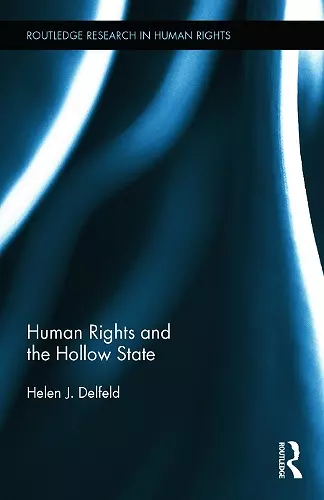Human Rights and the Hollow State
Format:Hardback
Publisher:Taylor & Francis Ltd
Published:19th Feb '14
Currently unavailable, and unfortunately no date known when it will be back

The book investigates the beliefs about governance that determine that state structures are the most appropriate venue for international human rights actors and activists to operate. Helen Delfeld argues that those beliefs rely on a normative perception of a nation-state, not necessarily applicable to most of the post-colonial world. While most post-colonial states may appear to demonstrate the trappings of modern nation-statehood, these projects are mostly spurred by and benefit an elite class. At the same time, there may be little identification with their government among the grassroots polity.
Delfeld focuses on the Philippines as an example of a post-colonial state, using nested case studies to show how people think differently about the state at different scales. Following a two-pronged approach, she investigates key moments of state action or inaction, and then asks people at the grassroots about their perspectives on governance, their engagement with the state, and their views of human rights. Her findings indicate that people at the grassroots rely on alternative forms of governance, often in the form of NGOs, INGOs, local cooperatives, informal networks, or structures that pre-date both colonization and independence. Her research also indicates the possibility that some of the most effective human rights actors do not rely on the state, as demonstrated by comparing locally-generated campaigns aimed at promoting environmental rights with state campaigns that address violence against women.
The Hollow State and Human Rights shows that rights initiatives misdirected through a "hollow state" might strengthen the mechanisms of the state, but might not actually create a more attentive nation-state. Human rights activists and actors may be far more effective by accessing local structures directly, the practical implications of which go beyond the Philippines to other post-colonial states.
"Helen Delfeld makes theoretical debates about failed states come alive by digging into the gritty political realities and complex perceptions of Filipinos coping with what she calls (accurately) the ‘hollow state.’ This book makes us all smarter about popular movements, NGOs, elite corruption and how to actually study the state."
—Cynthia Enloe, Clark University
"Grounded in richly observed case studies from the Philippines, this book offers a lively and penetrating critique of the stubborn insistence that the state is people’s best available protection, or the natural and fundamental frame for governance, justice, development and peace. Delfeld provides a highly readable investigation of what people in the communities studied actually rely on to provide social order or to pursue basic needs or social change. Her account has significant implications for questions of human rights, development, state-building and peace-building and brings into stark relief the misguided nature of efforts to promote human rights that fail to take local approaches to governance and efforts to work against violence seriously."
—M. Anne Brown, The University of Queensland
ISBN: 9780415707107
Dimensions: unknown
Weight: 410g
134 pages